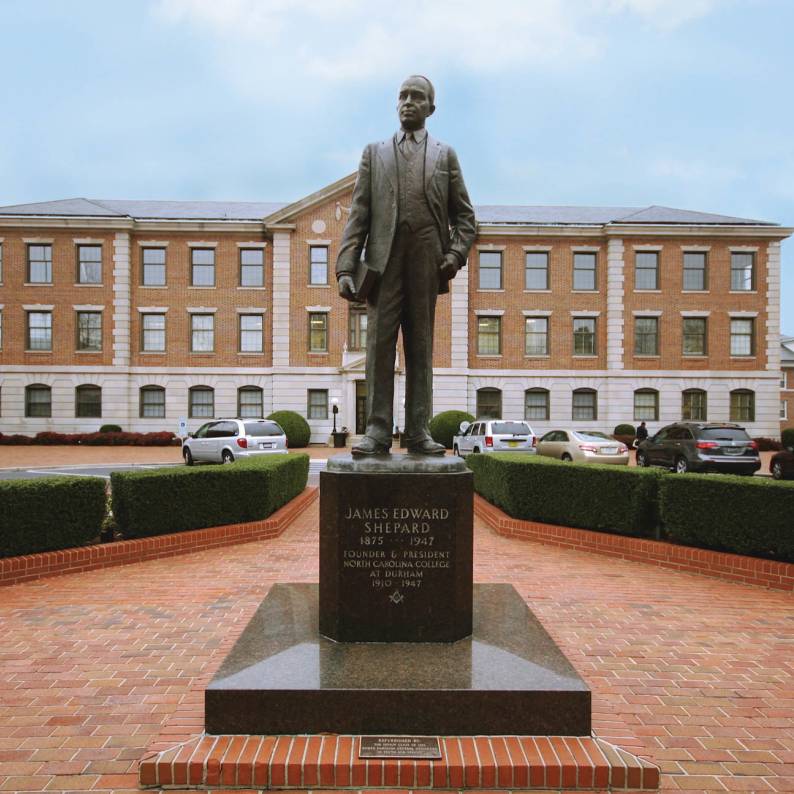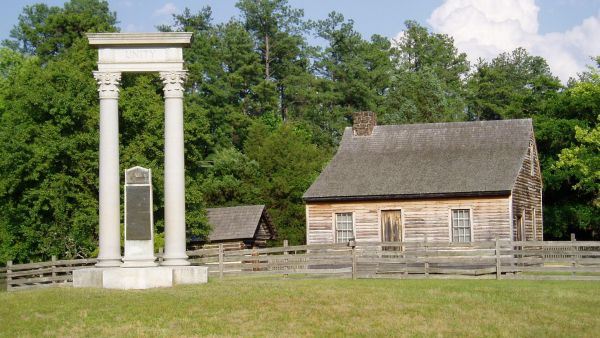American Tobacco Campus
300 Blackwell St
Durham, NC 27701
Details
Open in Google Maps
History
Travel through our time.
With a history that begins as the home of two tribes of Native Americans and continues as a city praised for its work in technology, education and healthcare, it is of little surprise that Durham's past is both eventful and noteworthy.
Durham's antebellum past has been preserved at Historic Stagville, once one of the largest plantations in the South. At Bennett Place, Durham would later host the negotiations that brought about the effective end to the Civil War, a historic site that can still be visited today (along with five Civil War Trail markers). The war's end became the beginning of the South's industrial revolution, starting with the tobacco and textile industries, which can be explored at Duke Homestead and repurposed mills and warehouses. In all, Durham has three state historic sites — more than any other county in North Carolina.
Durham is also where the civil rights movement gained significant traction, and is where one of the nation's premier Black universities made its home. Walk Black Wall Street. Explore the Hayti Heritage Center. See the historic Woolworth lunch counter where sit-ins occurred. Become acquainted with tributes to integration and progress at the Carolina Theatre, and myriad murals throughout the community. Pick up our African-American Heritage Guide when you visit the Visitor Info Center to find out where you can see, feel, learn, and embrace the past.
Museums
Home to art, sports, history, and nature and science museums, there’s plenty of opportunities to spend an afternoon (or a few) in Durham exploring new subjects in educational and entertaining ways.
The Museum of Durham History is a 21st century museum that uses stories about people, places, and things to foster curiosity, encourage further inquiry, and promote an understanding of diverse perspectives about the Durham community and its history. The museum puts its mission into action as a free, public venue that features rotating exhibits on a variety of Durham topics.
Established in 1891 by Edian Markham, a former enslaved person, St. Joseph’s Historic Foundation (SJHF) is a non-profit organization that manages the Hayti Heritage Center. SJHF is dedicated to preserving Durham's African American heritage and the impact of the Hayti Heritage Center, a cultural and educational venue that houses a community room, two classrooms, a dance studio, the Lyda Moore Merrick Gallery, and the historic 400-seat performance hall.
Beyond every corner lies an adventure. Discover the adventure of digging through the archives of Durham’s story.
the durham way



See something wrong with this listing? Contact blog@discoverdurham.com.
Beechwood Cemetery
3300 Fayetteville St
Durham, NC 27707
Details
Open in Google Maps
Bennett Place
4409 Bennett Memorial Rd
Durham, NC 27705
Details
Open in Google Maps
Black Wall Street / Historic Parrish Street
Parrish St
Durham, NC 27701
Details
Open in Google Maps
Black Wall Street / Historic Parrish Street
Parrish St
Durham, NC 27701
Brightleaf Square
905 W Main St
Durham, NC 27701
Details
Open in Google Maps
905 W Main St
Durham, NC 27701
Center for Documentary Studies at Duke University
1317 W Pettigrew St
Durham, NC 27705
Details
Open in Google Maps
Center for Documentary Studies at Duke University
1317 W Pettigrew St
Durham, NC 27705
Phone:
(919) 660-3663
Duke Basketball Museum and Sports Hall of Fame
306 Towerview Rd
Durham, NC 27710
Details
Open in Google Maps
Duke Basketball Museum and Sports Hall of Fame
306 Towerview Rd
Durham, NC 27710
Phone:
(919) 613-7500
Website
Duke Homestead State Historic Site
2828 Duke Homestead Rd
Durham, NC 27705
Details
Open in Google Maps
Duke Homestead State Historic Site
2828 Duke Homestead Rd
Durham, NC 27705
Phone:
(919) 627-6990
Website
Duke Memorial United Methodist
504 W Chapel Hill St
Durham, NC 27701
Details
Open in Google Maps
Duke Memorial United Methodist
504 W Chapel Hill St
Durham, NC 27701
Phone:
(919) 683-3467
Website
Duke University Chapel
401 Chapel Dr
Durham, NC 27708
Details
Open in Google Maps
Duke University Music Department
105 Mary Duke Biddle
Durham, NC 27708
Details
Open in Google Maps
Duke University Music Department
105 Mary Duke Biddle
Durham, NC 27708
Phone:
(919) 660-3300
Website
Durham Athletic Park
500 W Corporation St
Durham, NC 27701
Details
Open in Google Maps











